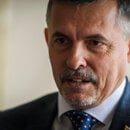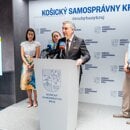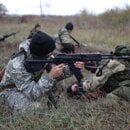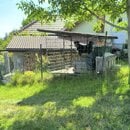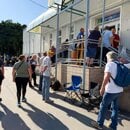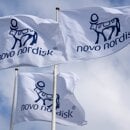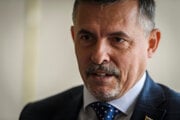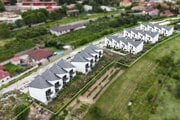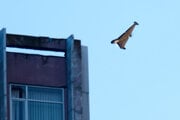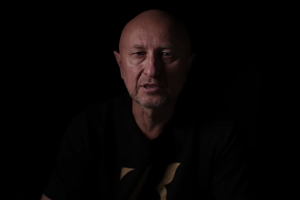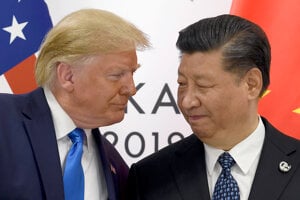NICOSIA (Reuters) - Sirens wailed over Nicosia early on Wednesday as Greek Cypriots remembered the 1974 coup that prompted the Turkish invasion and subsequent partition of the island. At 08.20 a.m. (0620 GMT), the precise time of the attack engineered by the military junta then ruling Greece, President Glafcos Clerides stepped out of the Presidential Palace. In a brief statement to journalists, Clerides, who has just returned from an official visit to Moscow, stressed that adherence to democracy was the only way to ensure the events of July 15, 1974 would never be repeated. All over the island politicians and various organisations are gearing up for the "black anniversaries` with a series of demonstrations and events to remember 1974. Five days after the coup against then Archbishop Makarios, the island`s elected president since independence from Britain in 1960, Turkey invaded Cyprus. During a second wave of military action on August 15, 1974, Turkey secured 37 per cent of the island`s territory and the breakaway Turkish Cypriot administration declared itself a state in 1983. It is recognised only by Ankara. Efforts by the United Nations and the international community to reunite the island have so far failed. Greek Cypriot plans to deploy Russian missiles on the island in the autumn have angered Turkey and further difficulties have arisen over the Cyprus government`s accession negotiations with the EU which the Turkish Cypriots refuse to accept. Their leader Rauf Denktash refuses to return to the U.N. negotiating table until the Cyprus-EU talks are scrapped. Diego Cordovez, the U.N. Secretary-General`s special coordinator who recently visited the island, is expected to resume his efforts in September.
SME
Nedeľa, 3. august, 2025 |
Meniny má Jerguš
16. júl 1998 o 0:00
Greek Cypriots Remember 1974 Coup
NICOSIA (Reuters) - Sirens wailed over Nicosia early on Wednesday as Greek Cypriots remembered the 1974 coup that prompted the Turkish invasion and subsequent partition of the island. At 08.20 a.m. (0620 GMT), the precise time of the attack engineered ...
Najčítanejšie na SME
- 1 . Čo je Glückova pasca a ako dezinfluencerka prestrelila u svojho publika (Dezinfomaják #39) 16 094x prečítané
- 2 . Učí 36 rokov matematiku, teraz s rodinou opúšťajú Slovensko: Najprv sme z toho mali bruchabôľ 6 795x prečítané
- 3 . Niké liga: Žilina s prvou výhrou v sezóne, na domácej pôde zdolala Prešov 5 674x prečítané
- 4 . Zomrel hokejista Peter Veselovský, s Košicami získal tituly, s reprezentáciou bronz 5 359x prečítané
- 5 . Roky jej tvrdili, že bolesti brucha si iba vymýšľa. Potom jej diagnostikovali Crohnovu chorobu 3 932x prečítané
- 6 . Keď sme ho presunuli do bytu, rozložil si spacák na balkóne. Návrat z ulice je komplikovaný 3 661x prečítané
- 7 . Má strážiť STVR, ale o Slaninových zmluvách na futbal za milióny Machalova rada stále nerokovala 3 269x prečítané
- 8 . Potápa sa český ostrov demokracie? (píše Petr Šabata) 3 219x prečítané
- 1 . Učí 36 rokov matematiku, teraz s rodinou opúšťajú Slovensko: Najprv sme z toho mali bruchabôľ 64 152x prečítané
- 2 . Zomrel hokejista Peter Veselovský, s Košicami získal tituly, s reprezentáciou bronz 25 991x prečítané
- 3 . Čo je Glückova pasca a ako dezinfluencerka prestrelila u svojho publika (Dezinfomaják #39) 22 857x prečítané
- 4 . Kaliňák a Glück sa stretli s bratmi Tateovcami, ktorí sú obvinení zo znásilnení a obchodovania s ľuďmi 20 475x prečítané
- 5 . Weiss perlil: Niektorí by nemali ísť ani okolo štadióna. Mám strach, že všetko sa môže rozbiť Video 18 473x prečítané
- 6 . Fico ako kôl v plote (píše Fedor Blaščák) 13 655x prečítané
- 7 . Pýchu dediny vymyslel, nakreslil, no jej dokončenia sa nedožil. Obrovské dielo je celé zo smreku Foto 13 394x prečítané
- 8 . Roky jej tvrdili, že bolesti brucha si iba vymýšľa. Potom jej diagnostikovali Crohnovu chorobu 13 269x prečítané
- 1. Trnka posiela policajtov do politiky, viní ich z dezinformácií. Trestné oznámenie však nepodal 165 292
- 2. Učí 36 rokov matematiku, teraz s rodinou opúšťajú Slovensko: Najprv sme z toho mali bruchabôľ 134 149
- 3. Za dotáciu z PPA nakúpil karavany. Hneď, ako mohol, ich nejasne predal a firmu zlikvidoval 46 040
- 4. Našiel hubu veľkú takmer ako hlava. Hubárom sa na Liptove darí, v lese zažili aj prekvapenia Foto 41 542
- 5. Kaliňák a Glück sa stretli s bratmi Tateovcami, ktorí sú obvinení zo znásilnení a obchodovania s ľuďmi 37 850
- 6. Frekventovanú cestu na strednom Slovensku zatarasil kombajn 36 310
- 7. Rusko na prahu zásadných zmien. Kremeľ potichu šliape na plyn pri budovaní druhej armády 36 276
- 8. Medveď sa do ovce pustil za bieleho dňa, priamo pri rodinnom dome 36 185
- 1 . Trnka posiela policajtov do politiky, viní ich z dezinformácií. Trestné oznámenie však nepodal 165 292
- 2 . Učí 36 rokov matematiku, teraz s rodinou opúšťajú Slovensko: Najprv sme z toho mali bruchabôľ 134 149
- 3 . VIDEO: Najdlhší most na Slovensku zmenila búrka na vodopád Video 110 211
- 4 . Zberateľský ošiaľ v Martine: Pre novinku prišli ľudia z celého Slovenska, vstávali aj o tretej ráno Foto 84 412
- 5 . V Bojniciach hospitalizovali deväť ľudí s rovnakými príznakmi ochorenia pľúc nejasného pôvodu 75 209
- 6 . Za dotáciu z PPA nakúpil karavany. Hneď, ako mohol, ich nejasne predal a firmu zlikvidoval 71 961
- 7 . Našiel hubu veľkú takmer ako hlava. Hubárom sa na Liptove darí, v lese zažili aj prekvapenia Foto 61 255
- 8 . Najhodnotnejšia firma Európy ťahala HDP celej krajiny. Prečo zrazu prudko padá? 58 448
Komerčné články
- Anna Macaláková: Výnos je len časť príbehu investície
- Slony, ticho savany, Kilimandžáro. Keňa je skvelá na prvé safari
- Sudoku a hlavolamy: Nenechajte sivé bunky zaháľať ani počas leta
- Kam v auguste k moru? 4 tipy na last minute dovolenku
- Sedemnásť hotelov, kde si oddych užijú deti aj dospelí
- Ako sa vyhnúť cukrovke 2. typu: Prvý krok urobte ešte dnes
- Vyžrebovanie futbalových súťaží: Kedy hrá vaše mesto či dedina?
- Prvý realitný fond ťaží z oživenia trhu a nižších sadzieb
- Slony, ticho savany, Kilimandžáro. Keňa je skvelá na prvé safari
- Anna Macaláková: Výnos je len časť príbehu investície
- Pochvala v teame nie je „bonus“, ale kyslík
- Sudoku a hlavolamy: Nenechajte sivé bunky zaháľať ani počas leta
- Kam v auguste k moru? 4 tipy na last minute dovolenku
- Drony menia lesníctvo, LESY SR testujú 3D modelovanie územia
- Sedemnásť hotelov, kde si oddych užijú deti aj dospelí
- Vyžrebovanie futbalových súťaží: Kedy hrá vaše mesto či dedina?
- Ako sa vyhnúť cukrovke 2. typu: Prvý krok urobte ešte dnes 17 065
- Kam v auguste k moru? 4 tipy na last minute dovolenku 15 817
- Sedemnásť hotelov, kde si oddych užijú deti aj dospelí 5 045
- Vyžrebovanie futbalových súťaží: Kedy hrá vaše mesto či dedina? 3 554
- Prvý realitný fond ťaží z oživenia trhu a nižších sadzieb 3 299
- Slony, ticho savany, Kilimandžáro. Keňa je skvelá na prvé safari 3 158
- Sudoku a hlavolamy: Nenechajte sivé bunky zaháľať ani počas leta 2 819
- Osem tipov, kam cestovať počas sviatku na konci augusta 1 945





